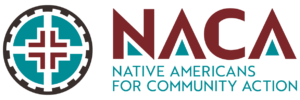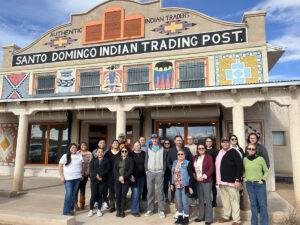Urban Indian Health Institute (UIHI) is a division of Seattle Indian Health Board. In 2023, UIHI worked with six sub awardees, Sage grantees, to implement Good Health and Wellness in Indian Country (GHWIC) strategies in Year 4. These grantees include:
- American Indian Community House (AICH) – New York, NY
- American Indian Health Service of Chicago (AIHSC) – Chicago, IL
- Grinding Stone Collective (GSC) – New York, NY
- So’oh-Shinálí Sister Project (SSSP) – Commerce, CA
- Texas Native Health (TNH) – Dallas, TX
- United American Indian Involvement (UAII) – Los Angeles, CA
The six grantees focused on preventing and addressing chronic disease by addressing risk factors for obesity, diabetes, commercial tobacco use, heart disease, and stroke through culturally driven activities and education. Grantees and UIHI were able to sustain chronic disease prevention capacity through challenging times by nurturing resilience. These efforts were highlighted during UIHI’s Talking Stories, qualitative interviews with Sage grantees to understand experiences, barriers, successes, partnerships, and collaborations.
While conducting Talking Stories, UIHI heard about the many ways in which sub awardees center culture throughout programming. For example, UAII created opportunities for youth and families to get physically active together at basketball camps and archery classes hosted through their Indigenous Fitness program. AIHSC worked with one of their community partners to put on senior luncheons where Elders could have their blood sugar and blood pressure checked by a nurse or learn about the health benefits of plants from a pharmacist. They also had a certified personal fitness trainer who helped community members implement individualized fitness exercises, goals and strategies, and nutrition education for diabetes prevention and weight loss.
AICH hosted or co-hosted a variety of physically engaging activities including powwow dancing, a youth weekend on Governor’s Island, and a five-mile race on Thanksgiving, welcoming runners of all ages to get in their daily dose of exercise while at the same time reflecting on the complex history of the holiday. GSC provided traditional cooking classes through their First Foods Program. Participants described an increase in their access to healthy foods and how the culturally attuned programming made them feel empowered as well as a sense of belonging and purpose in the community. SSSP implemented a cohort titled “Honoring Indigenous Health: Wellness Cohort,” which utilized education and cultural teachings to address type-2 diabetes and related chronic diseases. The events included a session on beading medicine bags and a conversation on mental wellness, a physician and herbalist-led lesson on the physiology of type-2 diabetes with teachings on how to make herbal teas for prevention and wellness, and finally, a session focused on traditional cooking and discussions on Native foodways.
TNH implemented cooking classes adapted for both children and adults. Participants learned how to make diabetic friendly recipes (vegetarian, low-calorie, low-sodium, and low-carbohydrate recipes) and shared that they enjoyed the comradery that came from sharing ideas about cooking and health. By focusing their efforts on traditional practices, community members responded enthusiastically to grantees’ culturally attuned programming, bringing good health and wellness to Indian Country.
At the First Foods Program, I got to spend time with my culture in a way that I’ve never experienced before. The one thing that really stuck with me was seeing the Elder Natalia cooking traditional Rican Taino food because it made me think of my grandparents who have passed on…I shared the pantry items with my family! I’m grateful for the community meal and for this organization.


Seattle, WA
Phone: (206) 324–9360
https://www.sihb.org/



